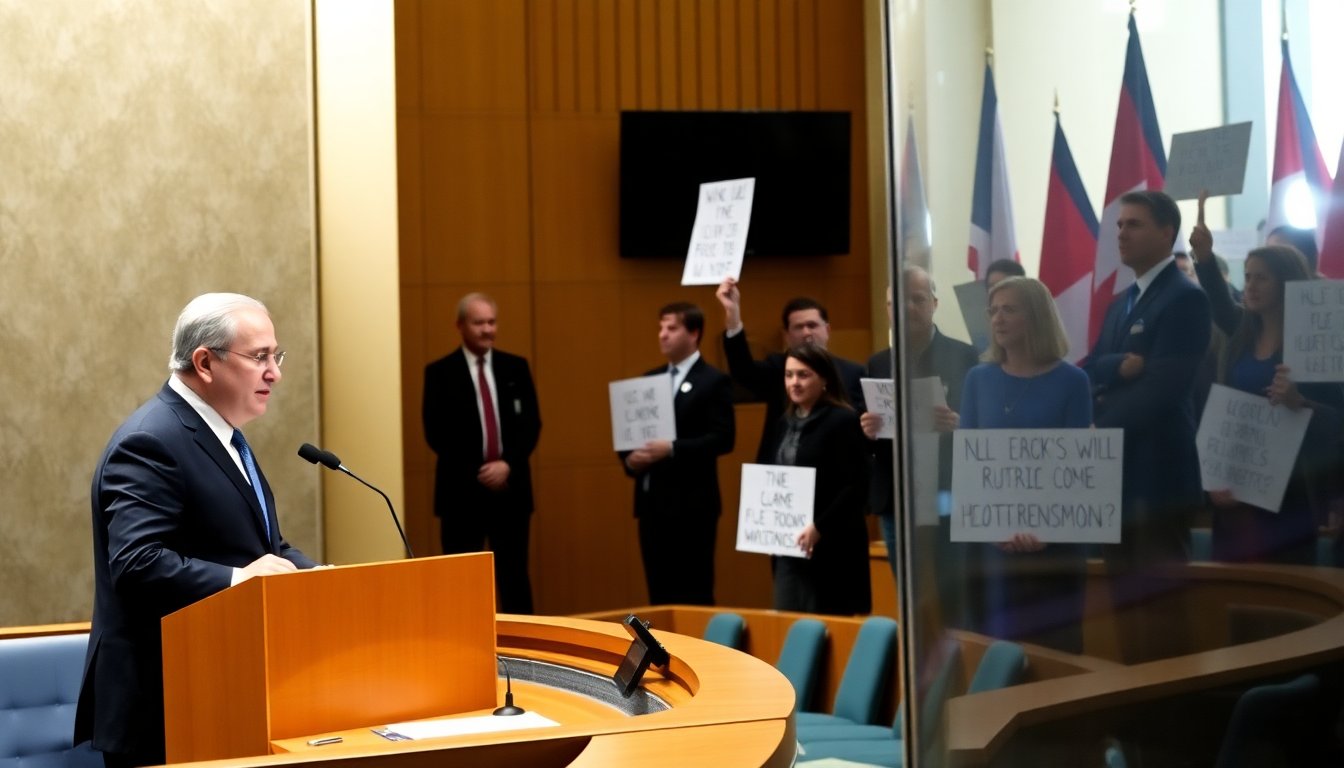Table of Contents
During a contentious session at the United Nations, Israeli Prime Minister Benjamin Netanyahu delivered a resolute address amid criticism and protests. Surrounded by demonstrators, he faced significant backlash but remained committed to confronting Hamas in Gaza. With increasing international pressure to cease hostilities, Netanyahu’s remarks conveyed a steadfast determination to “finish the job.”
As he spoke, several diplomats from various countries exited the assembly in protest, highlighting the growing divide between Israel and the global community. This walkout, involving representatives from multiple nations, underscored the rising discontent with Israel’s military actions.
Netanyahu’s bold declaration and international isolation
In his address, Netanyahu asserted, “While Western leaders might succumb to external pressures, I can assure you that Israel will stand firm.” This statement emerged against a backdrop of escalating criticism regarding his government’s approach to the Gaza conflict, where accusations of war crimes and human rights violations have intensified.
Utilizing visual aids, including a marked-up map labeled “THE CURSE” and a QR code on his jacket, Netanyahu engaged the audience with a thought-provoking multiple-choice question. He also praised U.S. President Donald Trump, recognizing him as a crucial ally in Israel’s military strategy.
Responses from the international community
Recent developments include announcements from countries such as Australia, Canada, and France recognizing an independent Palestinian state. In response, Netanyahu condemned these actions as “disgraceful,” warning that such decisions could incite further violence against Jewish communities and innocent civilians.
As tensions escalated, reports indicated that the Israeli military planned to take control of communication devices in Gaza to allegedly broadcast Netanyahu’s speech to residents and Hamas operatives. However, journalists in the region found no immediate evidence of this broadcast.
The call for peace and the humanitarian crisis
Amidst the turmoil of Netanyahu’s address, the European Union considered measures against Israel, including potential sanctions. This comes in light of a recent non-binding resolution passed by the assembly, urging Israel to take concrete steps toward recognizing a Palestinian state—an idea Netanyahu has firmly rejected.
The humanitarian impact of the conflict has been devastating, with reports indicating that over 65,000 Palestinians have lost their lives due to ongoing military operations. Approximately 90% of Gaza’s population has been displaced, with many facing starvation as conditions worsen.
Palestinian leadership’s call for action
On the eve of Netanyahu’s address, Palestinian leader Mahmoud Abbas delivered a video address to the General Assembly, as he was denied entry to the United States. He expressed gratitude for the recognition of Palestinian statehood while emphasizing that the international community must do more to support their quest for independence. “The time has come for the world to act justly toward the Palestinian people,” he declared, insisting they deserve freedom from occupation.
Abbas leads the internationally recognized Palestinian Authority, which governs parts of the West Bank, while Hamas governs Gaza. The ongoing conflict stems from historical territorial disputes, with Palestinians aspiring to establish a state encompassing the West Bank, East Jerusalem, and Gaza—territories seized by Israel during the 1967 war.
As he spoke, several diplomats from various countries exited the assembly in protest, highlighting the growing divide between Israel and the global community. This walkout, involving representatives from multiple nations, underscored the rising discontent with Israel’s military actions.0
As he spoke, several diplomats from various countries exited the assembly in protest, highlighting the growing divide between Israel and the global community. This walkout, involving representatives from multiple nations, underscored the rising discontent with Israel’s military actions.1


